What is community?
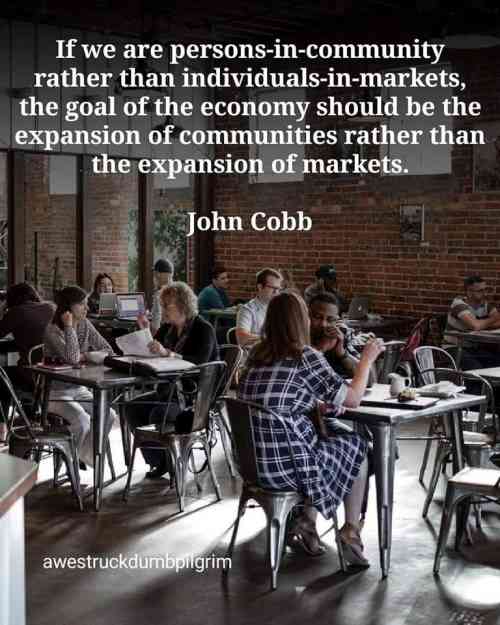
The first place I go when I visit caucus99percent.com is the community content section. The phrase virtual community gets tossed around a lot, especially during these social distancing times. And you might say that hippie communes have evolved into what are called intentional communities. But what does community really mean? When have you experienced community? Our conversation continues, below the break, with the story of Clarence Jordan and the story of The Simple Way
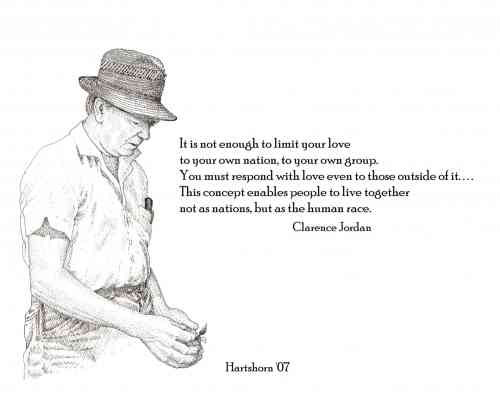
Baptist preacher Clarence Jordan became convinced that the Gospel was not just about a personal encounter with the living Jesus – which Jordan had himself at the start of his Christian journey, and very much believed in. It was also about social transformation and about reconciling all people as one. Influenced by early Christian progressives like Walter Rauschenbusch, Jordan began to preach that our faith was as much about the Kingdom of God as it was about a personal experience of Jesus through “being saved” or “being born again”.
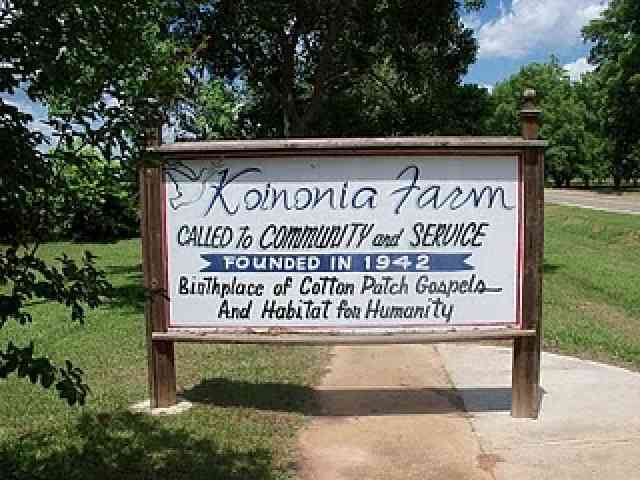
Koinonia Farm formed in the 1940s in Americus, Georgia. During this time the law divided people in the south along racial lines: there white schools and black schools, white businesses and black businesses, white sides of town and black, white and black churches. And if you crossed those racial lines you ended up the creek without a paddle. You could be attacked and lynched by a mob. Even the law itself could turn on you.
Jordan looked at the example of the early Christians in the book of Acts and saw how they sold their excess goods, gave to the poor, pooled their resources together so none went without. He chose to form a farm that did just this: where intentionally those formerly poor and formerly rich worked together hand in hand as equals, where black and white families worked together as if a part of the same family farm, and the principles just described of the Kingdom were the guiding light for how the community functioned. Sharing all things in common, this community became a strong and powerful witness to how the Gospel of reconciliation if followed would tear down the entrenched racial divides and systemic bigotries of the southeast.
Ultimately Martin Luther King and the early Civil Rights movement finds much support from the Koinonia community. Yet they faced ongoing persecution from the community at large due to their stance against the prevailing bigotry and racism of their day. And even at points where some in the Civil Rights movement seem to communicate that racism can be ended by politics and legislation, the Koinonia community stood firm that overturning racism will take more than legislation but also requires transformation of the heart and of the community at large.
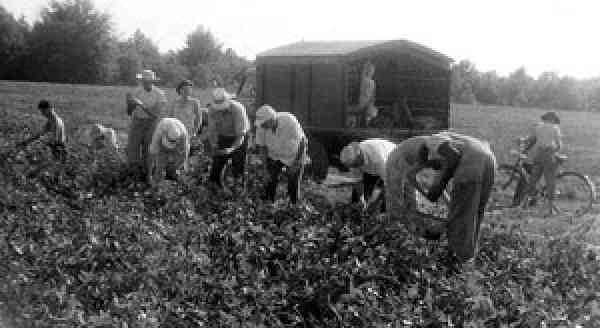
On February 24, 1957, the KKK held a 150-person rally in Americus, Ga, drawing men and women from around the region. Following the rally, they assembled a 70-80 car motorcade and drove 10 miles down the highway to a Christian community called Koinonia Farm. They came to ask the community to move out of town, offering that the Klan would see to it that they received full value for their property and equipment. The community refused. For years, the racial tension in the small Southwest Georgia town had been escalating. Koinonia Farm began in 1942, and lived in relative peace for many years. From the earliest days, the community's pacifist, equality of brother/sisterhood, and communal beliefs were challenged, but not as violently as they would be in the following decades. That violence began in 1950, when Koinonia members were ex-communicated from nearly all the churches in town.
The story of Koinonia Farm's involvement in the Civil Rights Movement is well-documented. The community's roadside market was blown up, fences were cut to let loose the pigs onto the highway, hundreds of trees were chopped down, and the community endured nightly drive-by shootings onto the property. Supporters from around the country came to stand in solidarity with Koinonia during this time. One such supporter was Dorothy Day, who was shot at and nearly killed during Holy Week 1957. Dr King refused to come to Americus, and called the city's sheriff the meanest man in the world. The bombings and shootings were accompanied by a KKK-mandated economic boycott. When a downtown store dared to do business with Koinonia, the storefront was blown up that very night.
The community responded by starting a mail-order business, selling hams, pecans, and baked goods to supporters around the country. The business slogan showed the community's creative zeal - "Help Us Ship the Nuts Out of Georgia!" The money from this business has largely supported the Koinonia community through the decades, as well as their many ministries. One well-known ministry that came out of their work with local neighbors is now known around the world as Habitat for Humanity. Another is Jubilee Partners, a community that has welcomed refugees since 1980.
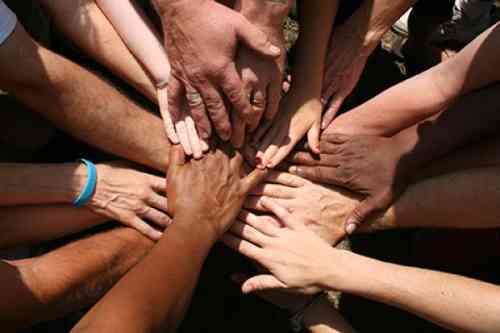
*Learn more about Koinonia's history*
In 1995, dozens of homeless families had moved into an abandoned Catholic church building in North Philadelphia. They were told by the Archdiocese that they had 48 hours to move out, or they could be arrested. With nowhere to go, these courageous mothers and children hung a banner on the front of the building that said, “How can we worship a homeless man on Sunday, and ignore one on Monday?” The families held their own press conference and announced that they had talked with the real “Owner” of the building (the Lord Almighty!) – and God said they could stay until they found somewhere else to go.
That was the spark that lit the fire of The Simple Way.
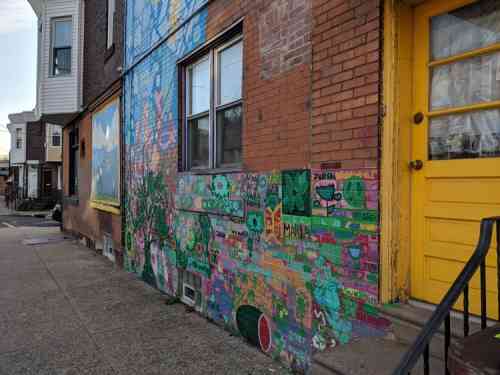
A few years after the takeover of the church ended -- in January 1998 -- some of the students who had been a part of that movement pooled their money together and bought 3234 Potter Street. They took an old shoe repair store and made it their home. Before long they grew into other abandoned houses on the block.
Since that experience in 1995, we have been inspired by the early church in the book of Acts, where the Bible says the early Christians shared all their possessions in common, gave freely to those in need, and met in each other’s homes for worship. The Gospel was lived out of dinner tables and living rooms.
And now – after over two decades -- an intentional community has turned into a little village of neighbors sharing life and working together.


Comments
The views of many churches today
are antithetical to the teachings ascribed to Jesus of Nazareth. Many leaders of the civil rights and anti-war movements of the 60's and 70's were religious. I believe churches have been one of the targets of the post Powell memo takeover of American society by corporate right wingers.
A community need only involve
two.
Three is company. Always welcomed. Not always wanted.
Regardless of the path in life I chose, I realize it's always forward, never straight.
Good example of community action taken
in spite of those who feel their control is threatened.
A group drawn together for a shared value in a greater good.
This idea of community is what will help us survive the immanent
collapse of the military / extraction / finance empire structure.
Thanks philly.
Zionism is a social disease
Honestly, I don't know what community is or is supposed to be...
Heck, just about everything I've learned since I was a kid has been turned up side down. I wasn't raised in the church or that life style if you will. We kids were allowed to make up our own minds about God, religion, politics, or whatever. I've been apart of "organizations" and such that had a "community spirit" if you will, but nothing like where everyone pitches in and collaborates equally, what they can / what they need etc...
But of course I've always been more of a loner, or walking to my own beat if you will. I've never, really liked "American" society because of the rank hypocrisy, and epidemic level of mind numbing, cognitive dissonance inducing contradictions that's enough to make anyone insane, if you're aware of it.
If the "crowd" is going one way, I'm usually going the other, tilting at wind mills...
C99, my refuge from an insane world. #ForceTheVote